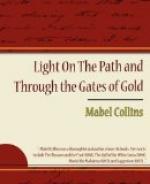Why does not the creature man return into that great womb of silence whence he came, and remain in peace, as the unborn child is at peace before the impetus of life has reached it? He does not do so because he hungers for pleasure and pain, joy and grief, anger and love. The unfortunate man will maintain that he has no desire for life; and yet he proves his words false by living. None can compel him to live; the galley-slave may be chained to his oar, but his life cannot be chained to his body. The superb mechanism of the human body is as useless as an engine whose fires are not lit, if the will to live ceases,—that will which we maintain resolutely and without pause, and which enables us to perform the tasks which otherwise would fill us with dismay, as, for instance, the momently drawing in and giving out of the breath. Such herculean efforts as this we carry on without complaint, and indeed with pleasure, in order that we may exist in the midst of innumerable sensations.
And more; we are content, for the most part, to go on without object or aim, without any idea of a goal or understanding of which way we are going. When the man first becomes aware of this aimlessness, and is dimly conscious that he is working with great and constant efforts, and without any idea towards what end those efforts are directed, then descends on him the misery of nineteenth-century thought. He is lost and bewildered, and without hope. He becomes sceptical, disillusioned, weary, and asks the apparently unanswerable question whether it is indeed worth while to draw his breath for such unknown and seemingly unknowable results. But are these results unknowable? At least, to ask a lesser question, is it impossible to make a guess as to the direction in which our goal lies?
III
This question, born of sadness and weariness, which seems to us essentially part of the spirit of the nineteenth century, is in fact a question which must have been asked all through the ages. Could we go back throughout history intelligently, no doubt we should find that it came always with the hour when the flower of civilization had blown to its full, and when its petals were but slackly held together. The natural part of man has reached then its utmost height; he has rolled the stone up the Hill of Difficulty only to watch it roll back again when the summit is reached,—as in Egypt, in Rome, in Greece. Why this useless labor? Is it not enough to produce a weariness and sickness unutterable, to be forever accomplishing a task only to see it undone again? Yet that is what man has done throughout history, so far as our limited knowledge reaches. There is one summit to which, by immense and united efforts, he attains, where there is a great and brilliant efflorescence of all the intellectual, mental, and material part of his nature. The climax of sensuous perfection is reached, and then his hold weakens, his power grows




